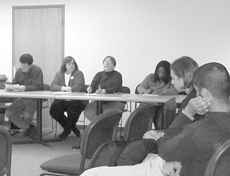In what started off looking like few would attend, a forum on the budget cuts sponsored by the Black Student Center managed to heat up. The forum started rocking after around twenty students and staff drifted into the Wheatley Lounge October 30 to hear four speakers talk about a hot topic-“Want to Know Where Your Money Goes?”
The forum was also videotaped by the Black Student Center.
Tom Goodkind, from SEIU 509, spoke first, giving a good summation of the current state of higher education. Goodkind noted that this university has lost a lot of people due to early retirement, attrition and lay-offs, yet the work has increased. “You may have found it more difficult to get into a class, to see people in the financial aid office, or complete any of the many other routine tasks necessary to actually get an education.”
Goodkind told of Governor Jane Swift’s veto of the pay raises for faculty and staff, and said, with UMass President William Bulger’s assistance, “we feel, the legislation was not allowed to over-ride the veto. People are demoralized, over-worked and underpaid, there are new buildings, flashy TV ads-but no emphasis on student services. They’re building dorms, but closing the child care.”
“There’s a big problem with the mission, as I see it, which is to provide an affordable education,” Goodkind said as he concluded his opening remarks.
Elizabeth Mock, the representative from the Faculty Union, picked up where Goodkind left off, mentioning that the university has lost fifteen percent of the full-time faculty, that faculty are dealing with “larger class sizes, more service and administrative tasks, …”
Mock pointed out that it has become more difficult to retain and recruit faculty, that prospective faculty have no faith in the promises made by a state that has not honored a signed contract. Mock, too, expressed concern about the changing mission of the University, that the University plans on building dorms, which will result in “re-directed resources,” from educational objectives to residential support requirements.
Susan Brown, Chief Steward of the Classified Staff, continued the theme, saying that, since the “layoffs,” employees “are doing a job and a half, or two jobs, for the price of one.”
Brown also noted that morale is low and she believed that absenteeism has probably increased.
Brown, as Goodkind had mentioned, also feels that much of the responsibility for the current crisis in higher education lays with UMass President William Bulger, the former President of the State Senate, who likely still wields power there. “Bulger won’t loudly proclaim to Finneran to fund these contracts.”
Brown continued that this crisis is not unique to the UMass System: “This affects twenty-nine other colleges and universities.”
At one point during the forum, Brown highlighted that “every other state-worker got their raises-this is an attack on higher ed.”
An audience member asked if the unions could sue the state over the non-funded contracts. Brown replied, “that’s a very good question, we’re doing that, but it takes time.”
Ethel Nixon, a UMB student, was the final panelist to speak, and spent much of her time speaking about the impact budget cuts are having on students: “Women are being penalized … This is affecting us, women are leaving school.”
Nixon also pointed out that there were no faculty in the audience, “If this is supposed to be a together thing, let’s work together-I don’t see everybody here.”
Another female student, from the audience, concurred and spoke in detail about her hardships at UMass Boston and her struggle to build her life from her former situation as a welfare mother.
Nixon continued expressing her anger at the lack of support for disadvantaged students: “What is the student body doing for me? What is the faculty doing for me?”
Brown, in an apparent attempt to diffuse the angry mood, said, “We share your concerns,” and alluded to the changes coming from President Bulger and the Board of Trustees, “I think they want to change this into an upper-middle class institution.”
An audience member, Haitim Jean-Louis, from the Black Student Center, followed Brown’s words with a statement and question about student-faculty unity: “…How can we help you? How can you help us?”
UMB student Patrick Ayers, from the Socialist Club, spoke in detail about actions of the Federal and state governments that are damaging to the working class.
Mock pointed out that “we need to change the climate in the legislation,” while Goodkind re-iterated that the mission of the University is shifting away from low-income students. “We need to focus, and I feel that we need to focus on the President’s Office. I think it’s the President’s Office that is managing the shift.”
The forum broke-up as students and staff discussed possible future meetings and avenues action.





















































